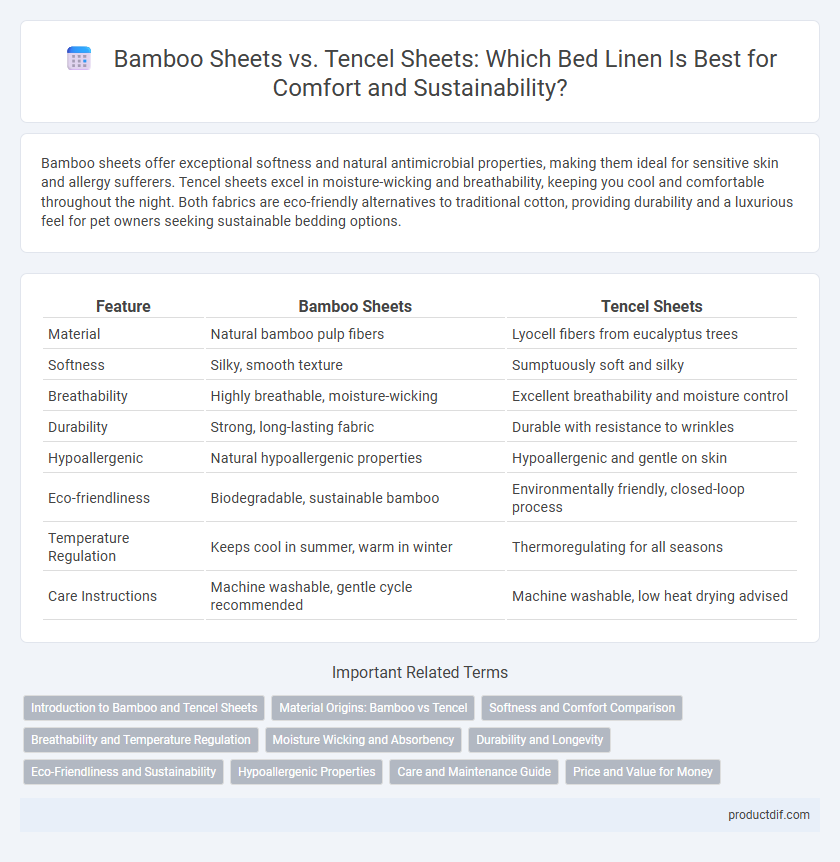Bamboo sheets offer exceptional softness and natural antimicrobial properties, making them ideal for sensitive skin and allergy sufferers. Tencel sheets excel in moisture-wicking and breathability, keeping you cool and comfortable throughout the night. Both fabrics are eco-friendly alternatives to traditional cotton, providing durability and a luxurious feel for pet owners seeking sustainable bedding options.
Table of Comparison
| Feature | Bamboo Sheets | Tencel Sheets |
|---|---|---|
| Material | Natural bamboo pulp fibers | Lyocell fibers from eucalyptus trees |
| Softness | Silky, smooth texture | Sumptuously soft and silky |
| Breathability | Highly breathable, moisture-wicking | Excellent breathability and moisture control |
| Durability | Strong, long-lasting fabric | Durable with resistance to wrinkles |
| Hypoallergenic | Natural hypoallergenic properties | Hypoallergenic and gentle on skin |
| Eco-friendliness | Biodegradable, sustainable bamboo | Environmentally friendly, closed-loop process |
| Temperature Regulation | Keeps cool in summer, warm in winter | Thermoregulating for all seasons |
| Care Instructions | Machine washable, gentle cycle recommended | Machine washable, low heat drying advised |
Introduction to Bamboo and Tencel Sheets
Bamboo sheets, made from bamboo pulp, offer a naturally breathable and moisture-wicking fabric ideal for hot sleepers. Tencel sheets, derived from sustainably sourced eucalyptus trees, provide a silky smooth texture with excellent temperature regulation and hypoallergenic properties. Both materials represent eco-friendly alternatives to traditional cotton, catering to consumers seeking comfort and environmental sustainability in bed linen.
Material Origins: Bamboo vs Tencel
Bamboo sheets originate from bamboo plants, a fast-growing grass known for its natural antimicrobial properties and eco-friendly cultivation that requires minimal water and pesticides. Tencel sheets are made from sustainably sourced eucalyptus trees, processed through a patented closed-loop system that recycles water and solvents, ensuring a low environmental impact. Both materials offer sustainable alternatives to traditional cotton, with bamboo emphasizing renewable grass fibers and Tencel highlighting responsible forestry and advanced manufacturing techniques.
Softness and Comfort Comparison
Bamboo sheets offer exceptional softness due to their micro-gauge fibers, providing a silky texture that enhances comfort and breathability, ideal for sensitive skin and warm climates. Tencel sheets, made from sustainable eucalyptus pulp, deliver a smooth, cool touch with moisture-wicking properties that regulate temperature effectively, making them comfortable for hot sleepers and year-round use. Both fabrics excel in softness and comfort, but bamboo emphasizes a plush feel while Tencel prioritizes temperature control and moisture management.
Breathability and Temperature Regulation
Bamboo sheets offer exceptional breathability due to their natural moisture-wicking fibers, which help regulate body temperature and keep sleepers cool and dry throughout the night. Tencel sheets, made from eucalyptus fibers, excel in temperature regulation by efficiently absorbing and releasing moisture, promoting a comfortable sleep environment. Both materials outperform traditional cotton in managing heat and humidity, making them ideal choices for hot sleepers seeking breathable bed linen.
Moisture Wicking and Absorbency
Bamboo sheets excel in moisture-wicking due to their natural breathability and hypoallergenic properties, effectively drawing moisture away from the skin to keep sleepers dry and comfortable. Tencel sheets, made from sustainably sourced eucalyptus fibers, offer superior absorbency with a smooth, silky texture that rapidly absorbs and evaporates sweat. Both fabrics outperform traditional cotton in managing moisture, making them ideal choices for hot sleepers or those prone to night sweats.
Durability and Longevity
Bamboo sheets are renowned for their strong, naturally resilient fibers that resist pilling and tearing, ensuring long-lasting durability through frequent washes. Tencel sheets, made from sustainably sourced eucalyptus wood pulp, offer impressive strength and maintain their softness and structural integrity over time, making them equally durable. Both materials provide excellent longevity, but bamboo sheets often excel in resilience, while Tencel sheets are prized for retaining their smooth texture after extended use.
Eco-Friendliness and Sustainability
Bamboo sheets boast exceptional eco-friendliness due to bamboo's rapid growth and minimal water requirements, making them a sustainable choice with natural antibacterial properties. Tencel sheets, derived from sustainably sourced eucalyptus trees using a closed-loop production process, offer a biodegradable and low-impact alternative that reduces chemical waste. Both options prioritize sustainability, with bamboo emphasizing resource efficiency and Tencel highlighting responsible forestry and environmentally conscious manufacturing.
Hypoallergenic Properties
Bamboo sheets offer natural hypoallergenic properties due to their antimicrobial fibers, reducing allergens and bacteria accumulation, which benefits sensitive skin. Tencel sheets, derived from eucalyptus wood pulp, also exhibit excellent hypoallergenic qualities by resisting dust mites and fungal growth, making them suitable for allergy sufferers. Both materials provide breathable, moisture-wicking fabrics that minimize irritation, enhancing overall sleep hygiene for individuals with allergies or sensitive skin.
Care and Maintenance Guide
Bamboo sheets require gentle washing in cold water and air drying or tumble drying on low heat to maintain their softness and durability. Tencel sheets benefit from machine washing in cold or warm water with a mild detergent, avoiding fabric softeners to preserve their moisture-wicking and breathable properties. Both types of sheets should be removed promptly from the dryer to prevent wrinkles and kept away from bleach to extend their lifespan.
Price and Value for Money
Bamboo sheets generally cost between $40 to $100, offering excellent moisture-wicking and antibacterial properties that enhance long-term durability. Tencel sheets, priced around $50 to $120, provide superior softness and eco-friendly fabric made from sustainably sourced wood pulp, justifying their higher cost for those seeking premium comfort. Both options deliver strong value for money, with bamboo excelling in affordability and moisture management, while Tencel offers a luxurious feel and environmental benefits.
Bamboo Sheets vs Tencel Sheets Infographic

 productdif.com
productdif.com